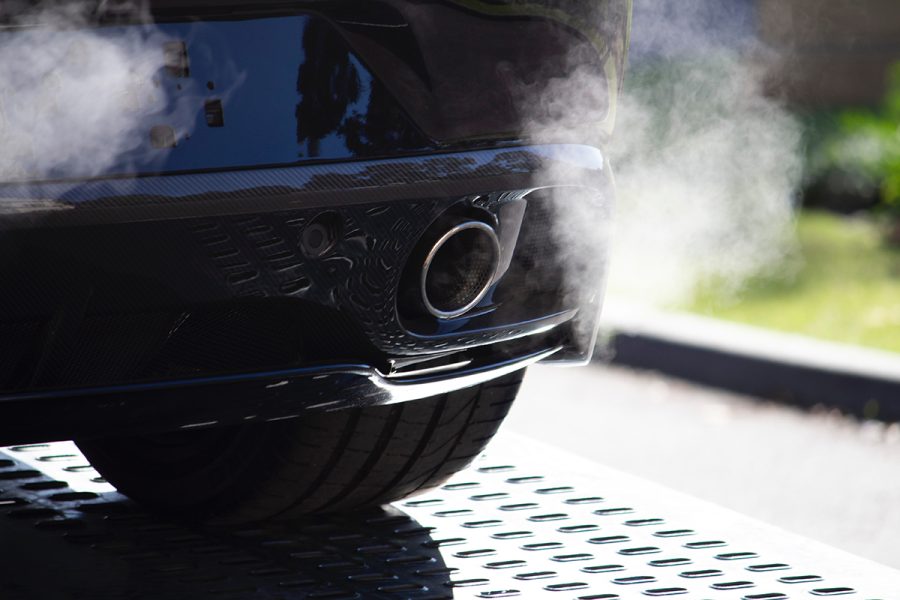UW-Eau Claire sees rise in catalytic converter theft
The UW-Eau Claire Police Department has noticed an increase in thefts as compared to previous years
The UW-Eau Claire Dean of Students, LaRue Pierce, sent an email on Friday, Feb. 18 warning Blugolds of the rise in catalytic converter thefts in the Eau Claire community.
Pierce said he wants to assure students that UW-Eau Claire administration is aware of the increased criminal activity and has implemented several safety monitoring efforts in all university parking lots.
According to Wikipedia, a catalytic converter is a part of a vehicle that converts pollutants in exhaust gas from an internal combustion engine into less-toxic pollutants by catalyzing a redox reaction. This part is essential for making a vehicle run properly.
Pierce said the occurrence of catalytic converter theft is “a serious concern” as catalytic converters are expensive to replace, costing around $2,000.
Sergeant Chris Kirchman of the UW-Eau Claire Police Department said in 2017, there were 11 reported thefts of catalytic converters in the city of Eau Claire, but none recorded in 2018 and 2019 following.
Kirchman said 2020 was when the police department noticed a significant increase in thefts. He said there were a total of 52 thefts in the city, four of which were on UW-Eau Claire property.
In 2021, this number only further increased, Kirchman said. There were 168 reported thefts with eight being on UW-Eau Claire property.
According to the PEW Research Center, catalytic converter thefts have risen dramatically on a national level as well. It said in 2019, there were 3,389 claims filed according to a report by the national insurance crime group.
The PEW Research Center website also said this number jumped 326% in 2020, totalling 14,443 claims filed.
“Since Jan. 1 (2022), UWEC has had 13 thefts,” Kirchman said. “The city is more than double that, but there’s been a spike in the campus community.”
Leigh Spitzer, a first-year accounting student, said she parked her vehicle in the Bollinger Field parking lot one Thursday night, and the next morning she returned to a dysfunctional vehicle.
Just about 20 minutes before she arrived at her vehicle that morning, she said she received the email from Pierce regarding the rise in thefts, only to find her catalytic converter was missing.
“I started up my car and it started making a really weird, rumbling noise,” Spitzer said.
Spitzer said she didn’t know the cause of the foreign sound coming from the vehicle, so she called her dad for assistance.
She said her dad asked her to show him the underneath of the vehicle, specifically starting at the exhaust pipe and following that pipe up the length of the car. That’s when she said they noticed the catalytic converter was missing.
Spitzer said out of pure luck, the vehicle she was driving during that time was actually her parents. She said her dad had backed into her vehicle while she was home visiting, so her parents let her take their vehicle back to Eau Claire with her for the week.
Kirchman said catalytic converters are favorable to steal because they’re easily removable in two to three minutes and they contain “precious metals” that can be sold for high profit.
According to the Sentinel Source, catalytic converters hold these “precious metals” called rhodium, platinum and palladium — all of which can go for thousands of dollars per ounce.
Kirchman said the UWECPD are taking steps to communicate with students both on and off-campus about precautions they can take to avoid catalytic converter theft.
He said having some sort of permanent marking on the vehicle’s catalytic converter will make it easier to identify if it were ever stolen, like spray paint or an etched license plate number.
Kirchman said he urges students to call in any suspicious activity to help them understand where these thefts are happening the most.
“Just know we realize it’s an ongoing situation here,” Kirchman said. “Not just on campus, but everywhere.”
Dirks can be reached at [email protected].

McKenna Dirks is a fourth-year journalism student and this is her seventh semester on The Spectator staff. She thrives under chaotic environments, loves plants and often gives off "granola girl" vibes with her Blundstone boots.











